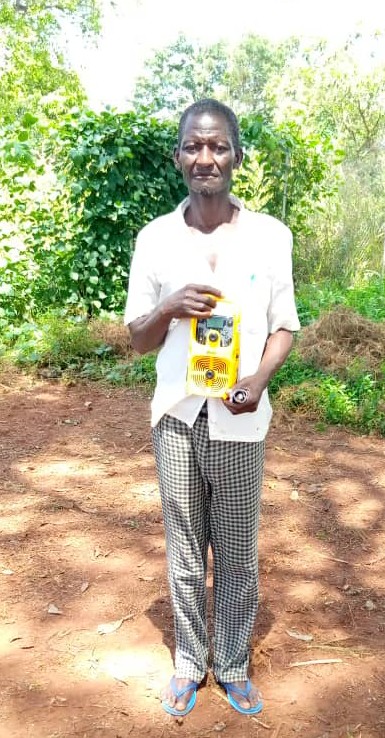Breaking Taboos Through Community Mobilisation
October 27, 2020 2:50 pm“My name is Fidele Ngbadara. I am a 73-year-old headman. My wife, Felesta, and I have been married for over 30 years living here in Ngboko Boma of Source in Yubu Payam, Tambura County.”
Fidele and Felesta have eight children – four boys and four girls, of which six are going to school. Two of their children have been out of school due to their physical disabilities. Fidele’s brother with his two wives stay with them. In total, they are thirteen (6 males & 7 females). This group has been listening to GESS’ ‘Our School’ radio programmes for the past five days as part of community mobilization activities taking place through family listening groups.
 “It has been a great privilege for us that you selected my family to benefit from this family listening group programme which is like an eye opener for us here in this Boma. Let me ask you: Where have you been before not to have come in time to open our eyes … our minds with this educating programmes on your radios?” he said.
“It has been a great privilege for us that you selected my family to benefit from this family listening group programme which is like an eye opener for us here in this Boma. Let me ask you: Where have you been before not to have come in time to open our eyes … our minds with this educating programmes on your radios?” he said.
“As I stated earlier, I am serving the community as a headman. Majority of the community members here are good people, depending on agriculture for a living. We have a school here at the church where we send our children, but the issues of norms and traditional beliefs still exist in our community like beliefs in charms; giving out girls for early marriage; and disabled children considered as a punishment from God on the family. Churches and some women groups, headmen and sub-chiefs and other community leaders have been struggling on how to educate our people to stop such practices, but sometimes it is very difficult and it will take time to wipe it out from people’s minds.”
“Why I am saying this, is because of the very touching story among the episodes we have heard from your radio programmes. We have heard and learnt how to fulfill the rights of children with disabilities. This happened when we listened to the story of the of a woman who used to carry her disabled daughter to school and put her there on a chair/local made bed to learn, and goes again to carry her back home after school.
This has touched our minds and has taught us a very good lesson, telling us of what we would have done for our two physically disabled children whom we thought were not to be enrolled in schools.”

Fidele with the solar-powered radio
“These two sons are disabled physically. The elder son is now 8 years old and his young brother the last born is 4 years. Whenever we thought of deciding how they can be supported to get education together with other children, our people here used to say children with different sorts of disabilities do not deserve education because they are a curse to the family. They are not to be sent to school but rather to say at home just to be fed by the families since they are like a curse by God to our family. There are some disabled children in our area and are just kept at home. But what I sometimes see with my two disabled children is when their elders return from school, they used to take their books and look into them and at some pictures which are on them, he related.”
“Now I have decided to enroll these children to school when schools open, and we shall be ready to support them just like that woman in your programme who used to carry her daughter on a chair to school and brings her back. I believe they can also become productive citizens as well in future but not to keep they away from schools like what we used to do before here in our community.”
The specific radio programme on disabilities affected Fidele to such an extent that he decided to try to bring about change in his community. He hopes to encourage other people in the community, especially those with children with disabilities, that they should no longer listen to outdated taboos. He believes that children with disabilities should be enrolled in school so that they can reach their full potential. He would also like to advocate for the government to provide training for teachers so that they can identify those with disabilities and tailor their teaching methods.
“I would like to thank the people you have come up with this programme. You said BBC Media Action under GESS project. It is opening up our eyes to stop believing in some traditional norms and taboos. We are requesting you to allow us at least one month to have the radios with us to keep on listening to those good and educative programs.”
Tags: Behaviour Change, Development, Disability Inclusion, EducationCannotWait, GESS, girls' education
Categorised in: Disability Inclusion, Social & Behavioural Change Communication